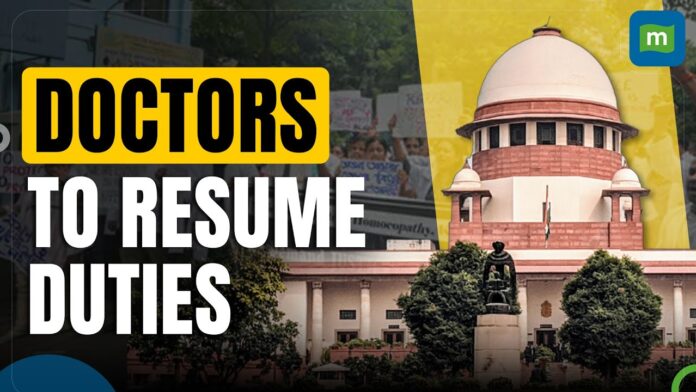In a significant shift, junior doctors in Bengal suspended their total strike, opting for an indefinite sit-in while threatening a hunger strike if their demands remain unmet
In a notable turn of events, junior doctors across Bengal have decided to call off their total cease work, which had persisted for 42 days following the tragic rape and murder of a postgraduate trainee doctor at RG Kar Medical College and Hospital. Instead of abandoning their cause, they are now staging an indefinite sit-in, determined to secure a response from the state government within 24 hours.
This decision comes after weeks of protests and tensions surrounding the horrifying incident that shook the medical community. The junior doctors previously halted all services in the wake of the August 9 attack, but after engaging in discussions with state officials on September 21, they resumed essential medical services. However, discontent brewed once again after a recent attack by a patient’s family at the College of Medicine & Sagore Dutta Hospital on October 1, prompting them to escalate their protests once more.
During a press conference, a spokesperson for the agitating doctors articulated their reasoning: “Considering the well-being of the patients, we’ve chosen to end our total cease work. However, we are not yielding to the pressure of the West Bengal government. If our demands are not met within 24 hours, we will have no choice but to initiate a hunger strike.” This sentiment echoed among the ranks of junior doctors, whose collective frustration has been compounded by recent events.
Adding to the tension, two junior doctors reported being assaulted by police during a peaceful protest march earlier in the day. They claimed that while they were exercising their right to peaceful demonstration and had received permission for their activities, they were met with unwarranted violence. “Two of our colleagues waiting near a road in Dharmatala were beaten up by the police. We do not know the reason. We were conducting a peaceful rally, and we protest this attitude of the police,” one doctor declared. Their call for accountability included a demand for an official apology from the police involved in the incident.
The junior doctors have made it clear that they seek immediate action from the government. Their demands include the formation of a central enquiry committee to investigate the alleged perpetrators involved in what they describe as a pervasive “threat culture” in all medical colleges across West Bengal. The frustration of these doctors is palpable; they are determined to ensure a safer working environment for themselves and their colleagues.
Previously, the doctors’ extended cease work was a powerful statement against the grave injustices they perceived within the healthcare system. During that time, their absence from work drew attention to the urgent need for reform and protective measures within the medical community. Their struggle was not just about their colleague; it became emblematic of the larger challenges facing healthcare professionals in the region.
With their latest action, the junior doctors are again bringing to the forefront issues that have long plagued the medical community. Holding up clocks during their protests, they have underscored the urgency of their demands. Their message is clear: time is running out, and they require immediate governmental intervention.
The situation has sparked widespread public support, with many citizens rallying behind the doctors’ cause. The combination of public sympathy and media coverage has heightened awareness of the issues surrounding the RG Kar case, as well as the broader context of violence against healthcare professionals in the state.
As tensions mount, the state government faces increasing pressure to respond effectively. The doctors have issued an ultimatum, signalling their readiness to escalate their protests should their demands go unaddressed. The imminent threat of a hunger strike looms over the authorities, putting them in a position where they must take decisive action to avert further unrest.
The RG Kar case has not only highlighted the tragic fate of a young medical professional but also opened a dialogue about the systemic issues within the medical community. As junior doctors push for reform and accountability, they are standing at the forefront of a movement demanding respect, safety, and justice.
In a moment that feels pivotal, the eyes of Bengal are on both the junior doctors and the government. Will the government act swiftly to address the concerns raised? The answer lies in the next 24 hours, as the junior doctors prepare for what could be the next chapter in this ongoing saga.
